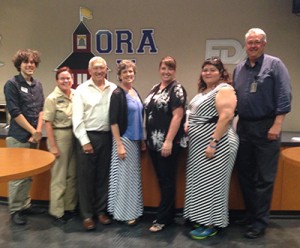Training Food Safety Personnel for New FSMA
Chris Brunner, August 26, 2015

Food safety inspection and investigator courses will be aided by the curriculum development underway by WIFSS and a team of government, private, and university institutions. This curriculum development helps to meet FSMA regulations to protect the nation’s food supply.
WIFSS team members participated in a meeting at the U.S. Food and Drug Administration’s Office of Regulatory Affairs (ORA) in Rockville, Maryland on August 11-13 that was hosted by FDA’s Integrated Food Safety System (IFSS). The meeting, which was facilitated by the International Food Protection Training Institute (IFPTI), was part of an ongoing effort to assist the FDA with development of the Integrated Food Safety System National Curriculum Framework that will be the foundation for training food safety inspectors and investigators to meet the requirements of the Food Safety Modernization Act (FSMA). FSMA is the most comprehensive reform of the nation’s food safety laws in more than 70 years. The goal is to ensure the U.S. food supply is safe by shifting the focus from response to prevention of contamination. This standardized curriculum helps FDA to train regulators to address hazards from farm to table, putting the importance on preventing foodborne illness.
Inspections will begin over the next five years. In this time high-risk domestic facilities must receive an initial inspection, and no less than one additional inspection every three years after that. FSMA states that FDA must inspect at least 600 foreign food facilities and double the number of those inspections every year for the next five years. With the availability of resources, such as this newly developed national curriculum framework, FDA will be better equipped to build the inspection capacity needed to meet these important goals.
In addition to WIFSS and IFPTI, other institutions participating in this project include the National Environmental Health Association (NEHA), Auburn University, North Carolina State University, and University of Tennessee. Over the next 11 months, each of these institutions or associations will be involved in the design and development of specific training materials that will align with the General Educational section of the National Curriculum Framework for FDA/IFSS.
“It is exciting that WIFSS is part of this very important national project. The work that we are doing will have a measurable impact on the safety of our food – domestically and internationally – which means healthier people world-wide,” emphasizes Dr. Bennie Osburn, director for outreach and training at WIFSS.

L-R – Gregory S. Wlasiuk, E-Learning Curriculum Designer, WIFSS; Deirdra Holloway, Program Officer, FDA-ORA; Bennie I. Osburn, Director, Outreach and Training, WIFSS; Amanda Arens, Program Manager, Outreach and Training, WIFSS; Heather Johnson, Instructional Systems Designer, WIFSS; Jessica Cadriel, Curriculum Designer, WIFSS; and James Fear, Director of the Integrated Food Safety System (IFSS)
The learning outcomes of the training materials will be based on the knowledge and skill-based competencies outlined in the framework. The goal is to create engaging and interactive training modules that will be available for all federal, state, local and tribal food safety officials in the U.S. and globally. Those in attendance from WIFSS included Dr. Bennie Osburn, Dr. Mandy Arens, Heather Johnson, Jessica Cadriel and Gregory S. Wlasiuk
